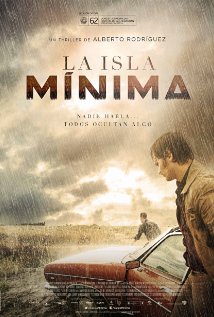
MARSHLAND
Spain, 2014, 105 minutes, Colour.
Javier Gutierrez, Raul Arevalo.
Directed by Alberto Rodríguez.
Marshland was the winner of several awards, especially in Spain, its country of origin.
Audiences always enjoy a solid detective investigation as well is an interesting murder mystery. Marshland provides these – and, with its setting in Andalucia and the marsh country, many audiences who appreciated the television series, True Detective, make some links.
The setting is very important, the strange marshlands and the people who live and work there, something of an isolated community. The time setting is also very important. It is 1980, four years after the end of the Franco regime which dominated Spain for four decades, the period of repression under fascist government. At this stage, the people are not used to the new freedoms and the film makes explicit allusions to police activity in the past, putting down protests, shooting people, torturing them and the cover-ups. It emerges that one of the detective sent to solve the current mystery had been a vigorous police torturer, something he denies, but proof is given that the accusation is true.
The film opens with overhead shots of the marshlands, looking like artificial diagrams, but with the camera slowly descending to the waterways, the fields, the intersections. And, on one of the roads, the detectives experiencing a car breakdown, and taken into the town.
The murder mystery concerns two teenage girls who disappeared, but their bodies, violated and mutilated, are soon found. It soon emerges that other girls have disappeared, parents upset and distraught.
The film shows the two detectives, quite different in personality, the older one more assured with a touch of humour and enjoying life, the other one in his 30s, much more serious, concerned about possible promotion to Madrid and phoning his pregnant wife.
Parents are interviewed. Other school students are also interviewed. Various characters in the town come under suspicion, and detection leads to a hunting lodge and an abandoned hut on the property. Some negatives of photos are found, indicating sexual behaviour. Brochures are also found from a company which is soliciting responses from young girls for better jobs in the city.
One of the characters in the town is a writer, imagining that he might become a Truman Capote, writing a ‘real life’ book about the crimes and investigations. He is particularly helpful in collaborating with the police, developing photos, giving information about the town.
The film is in delineating the characters of the two men, their capacity for working together, the differences in their temperaments. The local authorities want the crimes solved. Some of the people in the town become more suspicious as the investigation goes on, including a dangerous car pursuit at the night on the marshes.
Ultimately, the further victim is rescued, the mystery solved, the police are acclaimed and become famous in the newspapers.
But, along with the detection and the solved mystery, the film is most interesting in its re-creation of the place, the period, the people and the aftermath of the Franco regime.
1. A true story? Winner of many awards?
2. The time, the initial visuals during the credits, the design of the marshes? The tone, views, homes and the visuals of the countryside? Musical score?
3. 1980, Spanish society, Andalusia? The Franco era, society adjusting or not? The role of the police, the flashbacks of protest, shootings and torture? The officials after the political changes? The spirit of fascism?
4. The two detectives, the car breakdown, coming from Madrid, the commission to solve the case, the possibility for promotions? The skills? Personalities, Juan, jovial, his methods? Pedro, in his 30s, serious, the pregnant wife and phone calls?
5. The situation of the sisters, their age, appearance, upset, the interviews with the parents, the discussions with the school friends? The girls as wild, sex, the stories and speculation? The bodies found, the girls’ injuries? Violence, violation, cuts? The local police and inefficiency? The finding of the negative, and indications of sexual behaviour?
6. The parents, the harsh father, the wife giving more information?
7. Quini, his being with the girls, drawing the knife, questions, answers, his connections, reputation in the town, hostility, the investigations, the link to therich man, the man who had disappeared, exposure?
8. The local authority, his pressure on the detectives? Later, cover-up?
9. The journalist, wanting to write the story of the crime? His personality, information and help, developing the photos? His comments about Juan and his police brutality, Juan denying it, the photos and the truth?
10. The mansion, the owner, escape, the confrontation stories?
11. Marina, friendship, people’s concern, her being taken, in the boot of the car? The rescue?
12. Information about the job applications, the pamphlets, the way they we used, the stories of the other girls, the disappearance, anguish of the parents?
13. The two detectives, their work together, separately, the methods, getting information, collaboration?
14. The night, the pursuit, the marshes?
15. The contribution of the local police?
16. Making connections, the owner of the mansion, the perfume, the missing man and the story about him, leaving? The sex trade and abuse?
17. The aftermath, acclaim in the papers, Juan and the girls and the, Pedro and his promotion, talking with his wife, Madrid, and the truth about Juan?
18. The probing of the ethos of a small town, in the post-Franco era, its ethos?